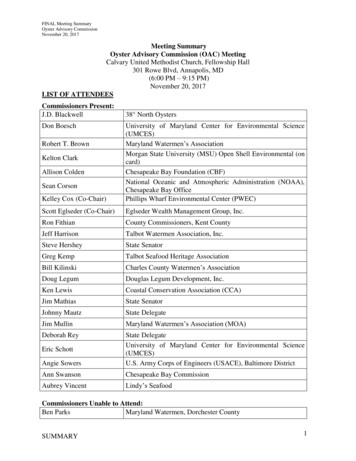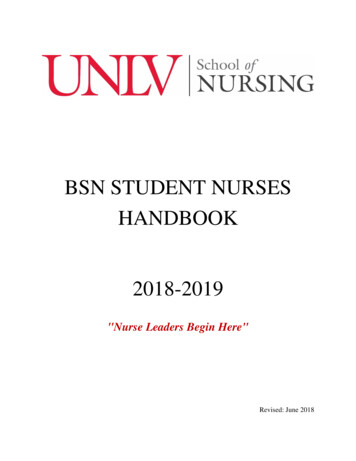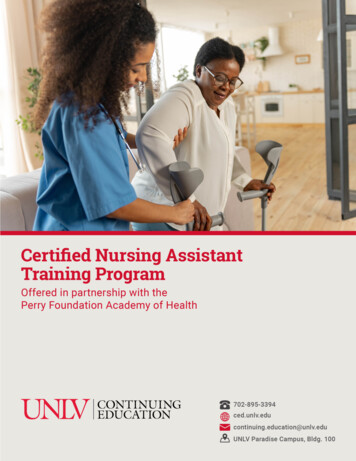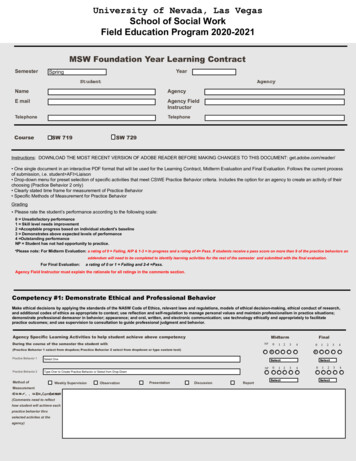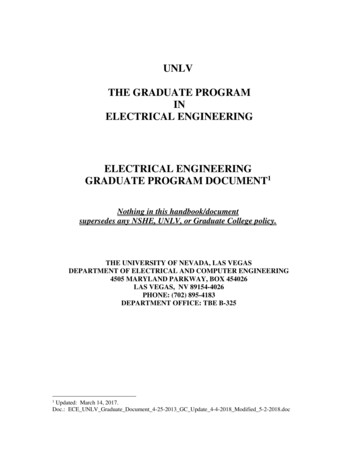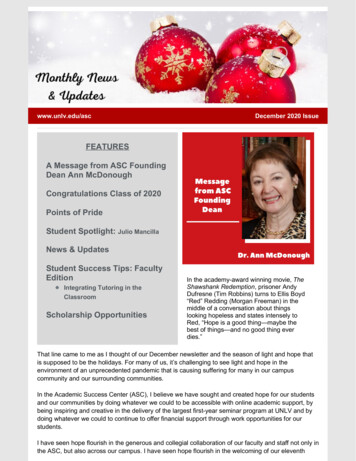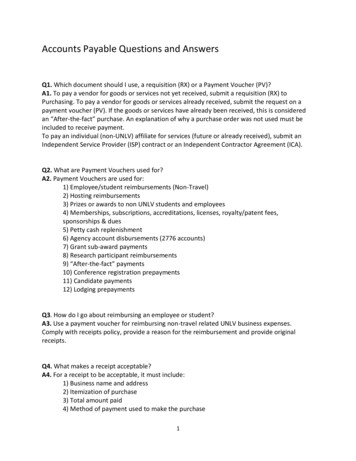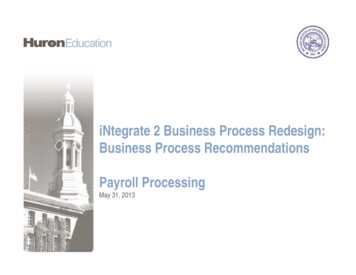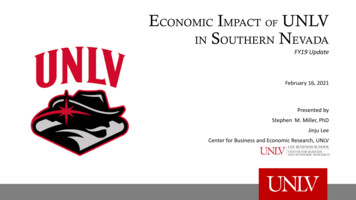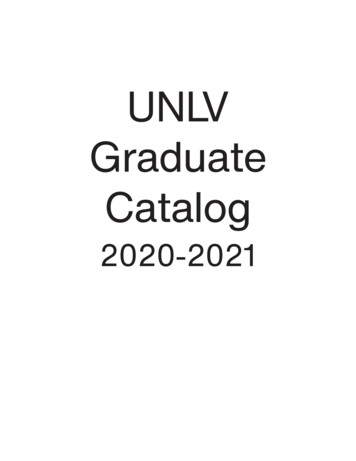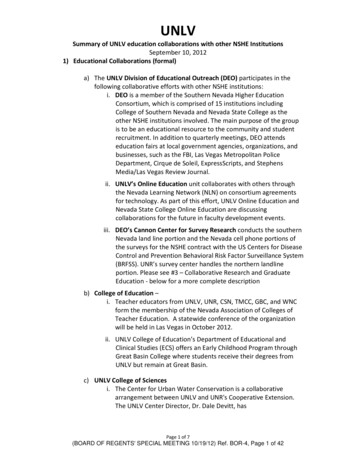
Transcription
UNLVSummary of UNLV education collaborations with other NSHE InstitutionsSeptember 10, 20121) Educational Collaborations (formal)a) The UNLV Division of Educational Outreach (DEO) participates in thefollowing collaborative efforts with other NSHE institutions:i. DEO is a member of the Southern Nevada Higher EducationConsortium, which is comprised of 15 institutions includingCollege of Southern Nevada and Nevada State College as theother NSHE institutions involved. The main purpose of the groupis to be an educational resource to the community and studentrecruitment. In addition to quarterly meetings, DEO attendseducation fairs at local government agencies, organizations, andbusinesses, such as the FBI, Las Vegas Metropolitan PoliceDepartment, Cirque de Soleil, ExpressScripts, and StephensMedia/Las Vegas Review Journal.ii. UNLV’s Online Education unit collaborates with others throughthe Nevada Learning Network (NLN) on consortium agreementsfor technology. As part of this effort, UNLV Online Education andNevada State College Online Education are discussingcollaborations for the future in faculty development events.iii. DEO’s Cannon Center for Survey Research conducts the southernNevada land line portion and the Nevada cell phone portions ofthe surveys for the NSHE contract with the US Centers for DiseaseControl and Prevention Behavioral Risk Factor Surveillance System(BRFSS). UNR’s survey center handles the northern landlineportion. Please see #3 – Collaborative Research and GraduateEducation - below for a more complete descriptionb) College of Education –i. Teacher educators from UNLV, UNR, CSN, TMCC, GBC, and WNCform the membership of the Nevada Association of Colleges ofTeacher Education. A statewide conference of the organizationwill be held in Las Vegas in October 2012.ii. UNLV College of Education’s Department of Educational andClinical Studies (ECS) offers an Early Childhood Program throughGreat Basin College where students receive their degrees fromUNLV but remain at Great Basin.c) UNLV College of Sciencesi. The Center for Urban Water Conservation is a collaborativearrangement between UNLV and UNR's Cooperative Extension.The UNLV Center Director, Dr. Dale Devitt, hasPage 1 of 7(BOARD OF REGENTS' SPECIAL MEETING 10/19/12) Ref. BOR-4, Page 1 of 42
UNLVSummary of UNLV education collaborations with other NSHE InstitutionsSeptember 10, 20121. organized an ongoing summer lecture series run with thehelp from UNR Cooperative Extension's Master Gardenerprogram.2. Over the last 10 years, Dr. Devitt has published multiplepeer reviewed scientific articles with CooperativeExtension faculty as co-authors and also participated inpublication of over 100 Extension articles, fact sheets andExtension bulletins that are distributed to the citizens ofNevada.ii. UNLV and UNR Geoscience faculty offered summer in-serviceworkshop for Nevada earth science teachers focused on localgeology and climate change from 2007 through 2011.iii. UNLV Geoscience faculty member David Kreamer has been aparticipant in the UNR-DRI Hydrologic Sciences graduate programfor 21 years (1991-2012).iv. NIH INBRE works between UNLV, UNR, UNSOM, CSN, NSC andTMCC to support the development of biomedical research acrossthe state of Nevada. Additionally, this program supports UROPprograms at UNR and UNLV, biomedical pipeline programs at CSNand TMCC and undergraduate research activities at NSC.d) UNLV Librariesi. On August 1, 2012 participated in the 1st Nevada AcademicLibraries Virtual conference as the first of what is intended to bean ongoing venue for communication among the academiclibrarians at NSHE institutions, with particular attention to libraryinstruction programs and practices.ii. In August 2012, UNLV Libraries’ Dean Patricia Iannuzzi presenteda workshop for librarians at the University of Nevada Reno Libraryon Contributions to Student Learning: A Practical Approach. At theworkshop, Dean Iannuzzi guided library faculty throughvisualization and planning exercises on the three aspects of theireducational role: direct instruction of learning outcomes;partnering to ensure learning outcomes are embedded inclassroom assignments and courses; and planning for places in thecurriculum to make the most impact.e) NSF EPSCoR –i. The Undergraduate Research Opportunity Program (UROP)supports students from any NSHE institution, performing researchPage 2 of 7(BOARD OF REGENTS' SPECIAL MEETING 10/19/12) Ref. BOR-4, Page 2 of 42
UNLVSummary of UNLV education collaborations with other NSHE InstitutionsSeptember 10, 2012under the mentorship of a faculty member from one the threeresearch institutions (UNLV, UNR, DRI). The UROP program has asummer session and an academic year session. Students can bemajoring in any subject. However, at least half of the awards aregiven to projects that are related to climate change. The UROPprogram runs from 2008 to 2013. Every April we hold a NevadaUndergraduate Research Symposium (NURS), whereundergraduate students from any area (not limited to STEM) canpresent. The NURS alternates location between UNR and UNLV. Inthe most recent April (2012) NURS was held at the same time asthe Festival of Communities.ii. NSF EPSCoR – Summer institute in climate change for K-12teachers, primarily middle school teachers, delivered asprofessional development in the summer. UNLV faculty memberPatricia Mynster developed and taught the class. The institute wasadvertised through the two partner institutions, UNR and DRI.f) NSF Research Experience for Undergraduates (REU) program – REU hasbeen operating for 30 years. It supports 10 undergraduate physics majorsfrom outside UNLV, recruited nationally. Nevada students from outsideUNLV are eligible. UNLV has supported a student from UNR and morerecently a student from CSN. Students perform physics and astronomyresearch at UNLV, using the UNLV facilities, as well as facilities at a Deptof Energy Laboratory (the Advanced Photon Source at Argonne NationalLaboratory in Illinois). At the end of the summer, UNLV holds a postersession open to students in any STEM area supported by any agency. Theclosing poster session typically has 40-50 students presenting posters.2) Joint degree programs and partnershipsa) Joint - UNLV and UNR Schools of Nursing jointly operate the Doctor of NursingPractice (DNP) program. UNLV and UNR each teach 1/3 of the credits in theprogram and co-teach 1/3 of the credits, the doctoral project. The first classgraduated this Spring and the third class was just admitted this fall.b) Joint – UNLV and UNR Schools of Community Health Sciences offer a joint PhDdegree in Public Health. Students enrolled in the program can take courses atUNLV and UNR. Faculty at both UNLV and UNR chair students’ dissertationcommittees. Students and faculty participate in collaborative research projects.Students earn the degree from the institution at which their faculty advisor andresearch efforts are located.Page 3 of 7(BOARD OF REGENTS' SPECIAL MEETING 10/19/12) Ref. BOR-4, Page 3 of 42
UNLVSummary of UNLV education collaborations with other NSHE InstitutionsSeptember 10, 2012c) Partnership – UNLV and CSN are partnering with the National Park Service (U.S.NPS) to jointly train NPS uniformed officers in Criminal Justice. Officers take asemester at CSN’s police academy as part of their studies for a UNLV CriminalJustice Bachelor’s degreed) Partnership – UNLV’s College of Education works in collaboration with Clark HighSchool, the College of Southern Nevada, and Nevada State College to delivercoursework for students enrolled in the Teacher Academy at Clark High School(TEACH). Students enrolled in TEACH plan to pursue a career in education andare future teachers, librarians, and school counselors. Students participatingenroll in courses at UNLV, CSN, and NSC for up to 12 undergraduate credits.e) Partnership – UNLV’s Water Resources Management Master of Science programoperates through the collaboration of faculty from UNLV and DRI, who havetaught courses and participated in student graduate committees.3) Collaborative Research and Educationa) Jointly funded statewide contract – The UNLV and UNR Schools of Public Healthare now jointly operating the 700,000 state contract from the US Center forDisease Control (CDC) for the Behavior Risk Factor Surveillance System (BRFSS).Expenses and indirect cost recovery are shared. The survey, conducted everytwo years by random digit dialing of land and mobile telephone numbers,generates data that is analyzed and reported to the US CDC on behavioral riskfactors such as drug, tobacco and alcohol use. UNLV and UNR each have a facultymember who serves as project director, one for the south and one for the north.UNLV and UNR call centers generate the data, and UNLV and UNR faculty andgraduate students analyze and work up the data for the CDC report.b) Literacy and Mathematics Faculty members from UNLV’s Department ofTeaching and Learning along with Science faculty from College of SouthernNevada recently received a 130,000 Nevada Collaborative TeachingImprovement Program (NeCoTIP) grant to conduct research and to provideprofessional development to teachers in Clark County School District.c) Climate Change Research, Education, and Outreach – This is a 15,000,000research project sponsored by the National Science Foundation withparticipation from UNLV, UNR, DRI, and NSC. The focus is on building thecapacity to address issues associated with climate change research impacts inNevada.d) Nevada Renewable Energy Consortium (NVREC) – This is a collaborationbetween UNLV, UNR, DRI, CSN, and TMCC to build capacity in research,Page 4 of 7(BOARD OF REGENTS' SPECIAL MEETING 10/19/12) Ref. BOR-4, Page 4 of 42
UNLVSummary of UNLV education collaborations with other NSHE InstitutionsSeptember 10, 2012education, and outreach related to renewable energy in the state. This is fundedby the Department of Energy.e) Unmanned Aerial Systems Initiative and Proposal – This is an initiative thatinvolves the State Office of Economic Development, UNLV, UNR, and DRI to getNevada designated as a testbed for unmanned aerial systems. A proposal will bedeveloped for support from the Federal Aviation Administration.4) Support for other NSHE institutions’ programsa) Faculty in the UNLV Department of Educational and Clinical Studies (ECS) serveas clinical supervisors for counseling students at Great Basin College and itssatellite centers.b) UNLV’s ECS offers an Early Childhood Program through Great Basin Collegewhere students receive their degrees from UNLV but remain at Great Basin.5) Service on statewide bodies supporting educationa) UNLV’s College of Education Associate Dean is awaiting Governor Sandoval’sappointment to serve on the Commission of Professional Standards representingNSHE institutions.b) UNLV College of Education Associate Dean is currently serving on a TeacherLicensure Testing Program Task Force along with other faculty from UNR andNevada State College.c) UNLV Division of Research and Graduate Studies – The Vice President forResearch and the Business Development Officer sit on two Sector WorkforceDevleopment Councils (Green Sector Council and IT Sector Council) as part of theGovernor’s Workforce Investment Boards.6) Informal collaborations and conversationsa) UNLV’ College of Education is partnering within NSHE and the NevadaDepartment of Education creating an informal summit in order to improveinformation exchange between all NSHE institutions and the Nevada Departmentof Education.b) UNLV’s College of Education participates in ongoing conversations withcounterparts at University of Nevada Reno and Nevada State College regardingissues related to teacher licensure.Page 5 of 7(BOARD OF REGENTS' SPECIAL MEETING 10/19/12) Ref. BOR-4, Page 5 of 42
UNLVSummary of UNLV education collaborations with other NSHE InstitutionsSeptember 10, 2012c) UNLV Division of Educational Outreach Community2Campus team, along withrepresentatives from Nevada State and CSN. participated (along with theAcademic Success Center) at a Las Vegas Fire Fighter Unit educational fairAugust 14 and 15 at the training center.7) Articulated degree programsa) UNLV and CSN have a 2 2 agreement in Public Administration. CSN studentscompleting the Associate in Applied Science degree in Fire Science Management earn acredit towards a UNLV Bachelor of Arts degree in Public Administration – Fire SafetyAdministration concentration.b) UNLV and CSN cooperatively implement a 2 2 program designed to increase thenumber of baccalaureate degree level student prepared as elementary, secondary, earlychildhood, and special education teachers. Students take their general educationrequirements at CSN and then transfer to UNLV.8) Jointly offered and developed coursesa) UNLV College of Education - EDU 203, Introduction to Special Education, wasdeveloped jointly with UNLV/Department of Educational and Clinical Studies andCollege of Southern Nevada to include required materials and assignment.9) Shared facilities usea) The Clinical Simulation Center of Las Vegas (or CSCLV) is a 31,000 sq ft facilitythat opened at the Shadow Lane Campus in August 2009, and is shared amongthe University of Nevada - Las Vegas School of Nursing, Nevada State CollegeSchool of Nursing, and University of Nevada School of Medicine. The center isself-funded. Nursing students at all three institutions use the CSCLV to learn howto monitor and respond to patient health needs in a realistic setting.10) Course numberingUNLV participates in system-wide common course numbering efforts. UNLV’s Dr. GayleJuneau was recently designated the System team leader for this effort. UNLVadministrators and faculty meet with their NSHE counterparts to evaluate coursedescriptions and, if they are determined to be greater than 80% common, to agree on acommon number, title and description.Page 6 of 7(BOARD OF REGENTS' SPECIAL MEETING 10/19/12) Ref. BOR-4, Page 6 of 42
UNLVSummary of UNLV education collaborations with other NSHE InstitutionsSeptember 10, 201211) Advising, transfer and articulationUNLV and CSN have been meeting regularly to update the articulation agreements andtransfer contracts for all UNLV bachelor’s degree programs to reflect changes in themost recent CSN catalog and UNLV undergraduate catalog.12) Graduate committee serviceUNLV master’s and doctoral committees in the Colleges of Engineering, Sciences andMath and Urban Affairs have benefitted from the participation of DRI faculty.UNLV committees for the joint Public Health PhD are jointly staffed by UNLV andUNR faculty.Page 7 of 7(BOARD OF REGENTS' SPECIAL MEETING 10/19/12) Ref. BOR-4, Page 7 of 42
UNRCollaboration Between the University of Nevada, RenoAnd Other NSHE InstitutionsCommunity Colleges:1. Articulation agreements: For many years the University of Nevada, Reno hasparticipated in articulation agreements between the university and each communitycollege. These agreements entail a semester-by-semester set of courses which will fulfilla four-year degree, in a number of fields, with the first two years at the communitycollege and the final two years at the university. These articulation agreements havebeen improved continually as more emphasis has been placed on better and clearerpathways to graduation.2. Co-Admission: ln March, 2012, after two years of planning between community collegesand the university, the Board of Regents adopted a new Co-Admission policy. Theprogram permits a community college student with a desire to continue on to a fouryear degree to seek admission to the university as soon as the student passes a coremath and a core English class. The student continues to work at the community collegewith advisors from both the community college and the university. The purposes are toassure that all classes attempted apply toward the four-year degree and to stimulatestudents to maintain a four-year degree goal during the community college years. Thisnew policy is being implemented in fall, 2012 between the University of Nevada, Renoand Great Basin College, Truckee Meadows Community College, Western NevadaCollege, and the College of Southern Nevada.3. Northern Nevada teaching collaboration: The four northern Nevada teaching collegesare working together to determine how to deliver educational programs in ruralcommunities with limited college opportunities. Two pilot communities are underdiscussion (Hawthorne and Battle Mountain) which will include: interactive videodelivery of courses by Great Basin College, Truckee Meadows Community College,Western Nevada College and the University of Nevada, Reno, and co-location of acredit-course delivery site and a Cooperative Extension County office for non-crediteducational experiences. This is an early stage project.4. Several University of Nevada, Reno faculty participate in the small farm conferences puton by the Specialty Crop Institute of Western Nevada College.5. The College of Business at the University of Nevada, Reno works with the Department ofBusiness at Truckee Meadows Community College on a successful transfer programbetween the two units, including advisor, faculty, and administrator visits on specialevent days at TMCC.6. University of Nevada, Reno faculty have joined faculty of Truckee Meadows CommunityCollege in designing successful pathways for Washoe County School District students tocomplete programs at TMCC and the University. The Superintendent of Washoe CountySchool District and the Presidents of TMCC and UNR meet monthly to discuss issues andactions to address the issues. Currently, the three institutions are working together toimplement Signature Academies for specialized learning and career preparedness,1(BOARD OF REGENTS' SPECIAL MEETING 10/19/12) Ref. BOR-4, Page 8 of 42
testing math and English skills, and delivering training to Washoe County School Districtteachers to deliver college remedial education courses during the senior year of highschool with a purpose of reducing the need for remedial education in college anduniversity years.Desert Research Institute:1. Nevada Renewable Energy Consortium (NVREC)(provided by DRI):The NVREC is supported by federally directed funding that was brought forward bySenator Townsend in conjunction with Senator Reid. The Consortium is an associationof the three Nevada System of Higher Education (NSHE) research institutions (DRI,UNLV, UNR), along with participating Nevada community colleges. Overall projectmanagement is conducted by DRI. The Principle Investigators are Chancellor Klaich andPresident Wells. Specific objectives of the Consortium include the following:a. Increase competitiveness of NSHE’s research institutions in national renewableenergy research by fostering collaboration.b. Develop a strategic plan for future growth based on an NSHE inventory ofresearch capabilities, facilities, plus educational and outreach programs.c. Expand outreach, training, and workforce development programs withparticipating community colleges.d. Build partnerships with industry and enhance opportunities for expanding theeconomic impact of renewable energy programs in Nevada.e. Increase Nevada’s commercialization, economic analysis, public policy, andoutreach capabilities in renewable energy.Over the duration of the program, 24 collaborative research and 3 education/workforcedevelopment projects involving two or more NSHE institutions have been supported.2. Walker Basin (provided by DRI):DRI and UNR faculty have collaborated on a research program in the Walker Basin tosave Walker Lake through the lease or purchase of water rights from willing sellers whilemaintaining a strong agricultural community. This collaborative research program wassupported by funding from Desert Terminus Lakes funding through the Bureau ofReclamation. More than 120 DRI and UNR faculty, students and staff have worked onthis ongoing program which began in 2006. Examples of cooperative research efforts inthe Walker Basin include:a. Developing a deci
a) Joint - UNLV and UNR Schools of Nursing jointly operate the Doctor of Nursing Practice (DNP) program. UNLV and UNR each teach 1/3 of the credits in the program and co-teach 1/3 of the credits, the doctoral project. The first class graduated this Spring and the third class was just admitted this fall.
